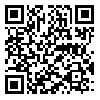Volume 22, Issue 2 (June 2024)
Iranian Rehabilitation Journal 2024, 22(2): 255-264 |
Back to browse issues page
Ethics code: IR.SBMU.MSP.REC.1395.449
Download citation:
BibTeX | RIS | EndNote | Medlars | ProCite | Reference Manager | RefWorks
Send citation to:



BibTeX | RIS | EndNote | Medlars | ProCite | Reference Manager | RefWorks
Send citation to:
Safarzadeh A, Bakhtiari M, Shaeiri M R, Ahmadvand Z, Kheradmand A, Saberihaji M et al . Comparing Dialectical-behavioral Skills Training Based on the Soler Model vs Family Education for Borderline Personality Disorder. Iranian Rehabilitation Journal 2024; 22 (2) :255-264
URL: http://irj.uswr.ac.ir/article-1-1855-en.html
URL: http://irj.uswr.ac.ir/article-1-1855-en.html
Atiyeh Safarzadeh *1 

 , Maryam Bakhtiari1
, Maryam Bakhtiari1 

 , Mohammad Reza Shaeiri2
, Mohammad Reza Shaeiri2 

 , Zahra Ahmadvand3
, Zahra Ahmadvand3 

 , Ali Kheradmand4
, Ali Kheradmand4 

 , Mohsen Saberihaji4
, Mohsen Saberihaji4 

 , Bonnie Bozorg5
, Bonnie Bozorg5 




 , Maryam Bakhtiari1
, Maryam Bakhtiari1 

 , Mohammad Reza Shaeiri2
, Mohammad Reza Shaeiri2 

 , Zahra Ahmadvand3
, Zahra Ahmadvand3 

 , Ali Kheradmand4
, Ali Kheradmand4 

 , Mohsen Saberihaji4
, Mohsen Saberihaji4 

 , Bonnie Bozorg5
, Bonnie Bozorg5 


1- Department of Clinical Psychology, School of Medicine, Shahid Beheshti University of Medical Sciences, Tehran, Iran.
2- Department of Psychology, Faculty of Psychology, Shahed University, Tehran, Iran.
3- Department of Clinical Psychology, School of Behavioral Sciences and Mental Health, Institute of Psychiatry, Iran University of Medical Sciences, Tehran, Iran.
4- Department of Psychiatry, School of Medicine, Shahid Beheshti University of Medical Sciences, Tehran, Iran.
5- Department of Student Mental Health & Counseling Services, School of Rehabilitation, Shahid Beheshti University of Medical Sciences, Tehran, Iran.
2- Department of Psychology, Faculty of Psychology, Shahed University, Tehran, Iran.
3- Department of Clinical Psychology, School of Behavioral Sciences and Mental Health, Institute of Psychiatry, Iran University of Medical Sciences, Tehran, Iran.
4- Department of Psychiatry, School of Medicine, Shahid Beheshti University of Medical Sciences, Tehran, Iran.
5- Department of Student Mental Health & Counseling Services, School of Rehabilitation, Shahid Beheshti University of Medical Sciences, Tehran, Iran.
Abstract: (3990 Views)
Objectives: The high prevalence of borderline personality disorder, along with comorbid psychiatric disorders and impulsive reactions (suicide attempts, self-mutilation, substance use, and impulsive behaviors) increase the need for effective psychological interventions. In this study, the effectiveness of dialectical behavior skills training based on the Soler method and family education with individual therapies are compared in this group of patients.
Methods: In this single-blind case study, eight cases were selected through a targeted sampling method based on the inclusion and exclusion criteria. The participants were divided into two groups: Intervention individually and individual intervention with family education. Both group members and the family members of the second group received dialectical behavior skills training based on the Soler model. The participants completed the borderline personality inventory, self-harm inventory, and Barratt impulsivity scale in four stages: At the beginning of the sessions, in the middle of the treatment, at the end of the treatment, and three months after treatment.
Results: The data were analyzed using the Wilcoxon test, Friedman test, and Mann-Whitney U test. The results indicate the effectiveness of the dialectical behavior skills training method based on the Soler model in reducing symptoms of borderline personality disorder and self-mutilation, as well as emotion regulation improvement at the significant level of P=0.05.
Discussion: This treatment is recommended as an effective and short-term method for controlling symptoms of borderline personality disorder. Family education, in addition to dialectical behavior therapy, has been shown to have a positive effect on reducing symptoms in patients.
Methods: In this single-blind case study, eight cases were selected through a targeted sampling method based on the inclusion and exclusion criteria. The participants were divided into two groups: Intervention individually and individual intervention with family education. Both group members and the family members of the second group received dialectical behavior skills training based on the Soler model. The participants completed the borderline personality inventory, self-harm inventory, and Barratt impulsivity scale in four stages: At the beginning of the sessions, in the middle of the treatment, at the end of the treatment, and three months after treatment.
Results: The data were analyzed using the Wilcoxon test, Friedman test, and Mann-Whitney U test. The results indicate the effectiveness of the dialectical behavior skills training method based on the Soler model in reducing symptoms of borderline personality disorder and self-mutilation, as well as emotion regulation improvement at the significant level of P=0.05.
Discussion: This treatment is recommended as an effective and short-term method for controlling symptoms of borderline personality disorder. Family education, in addition to dialectical behavior therapy, has been shown to have a positive effect on reducing symptoms in patients.
Keywords: Borderline personality disorder, Dialectical behavior therapy-skill training, Family therapy, Personality disorder
Article type: Original Research Articles |
Subject:
Psychology
Received: 2023/01/1 | Accepted: 2023/05/29 | Published: 2024/06/1
Received: 2023/01/1 | Accepted: 2023/05/29 | Published: 2024/06/1
Send email to the article author





